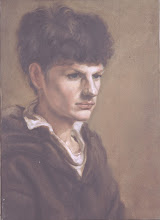In this solemn place
We sing -
To the bare bone
Of this building of stone
We bring
Breath of music
Breath of music
And the word becomes flesh.
Why did I choose this as a title? Because for me it is an apt illustration of where the power of music lies, and it provides a possible path for gaining access to our own expressive powers, closely linked as they are to our physical feelings and sensations. By taking command of our sensations, we can begin to direct our own emotional states, instead of being simply at their mercy. Here we have a clue as to the nature of the present – it can be passive and a victim, or active and a creator.
The passive present is a mere receptacle of effects from the past, and will serve to promote a repetition of what has already been. It is naturally reinforced by a lack of self-confidence, or by any other belief which undermines our primary subjective reality.
The active present is the fruit of our full acceptance of our own subjective reality, as being the true source of existence. This radical acceptance of the subjective element as the permanent foundation of our lives is one of the cornerstones of “quantum” theories of being, which take as their point of departure analogies to the Heisenberg principle, Observer effect, and other aspects aired in discussions on quantum mechanics. Stated simply, our experience of the world and truth is our own, and neither can nor should be equated to that of someone else. So if we cannot separate ourselves from our own subjectivity, because in reality that subjectivity is an integral part of our reality, then we must also cease to downgrade it – which is what our collective cultural heritage has, in effect, encouraged us to do until now.
It is this undermining of our subjective sense of Presence which, more than anything else, causes us to lose the Ariadne’s thread of our existence and wander aimlessly in the Labyrinth, with little more for our sustenance than the hope of avoiding the hidden monster at its centre.

1 comment:
Acredito que a música só é verdadeiramente feita se for sentida, tal como sentimos dentro de nós a necessidade de respirar (num momento específico da nossa existência, a música é o elemento principal a acontecer),portanto deve ser feita de um modo tão natural como o resto que nos move para a vida. Cada pessoa sente a música como parte da sua vivência, logo, como é algo tão "pessoalmente" nosso, só deveremos, talvez, saber interpretar a música que é feita por nós, "respirada" por nós...
Post a Comment